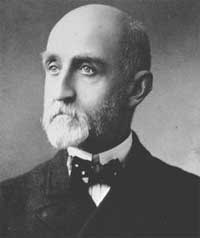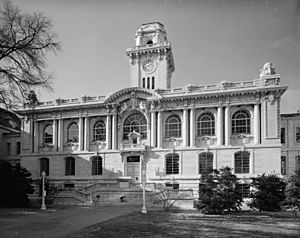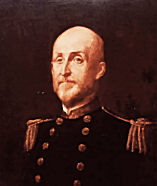Alfred Thayer Mahan facts for kids
Quick facts for kids
Alfred Thayer Mahan
|
|
|---|---|
 |
|
| Born | September 27, 1840 West Point, New York, U.S. |
| Died | December 1, 1914 (aged 74) Washington, D.C., U.S. |
| Allegiance | |
| Service/ |
|
| Years of service | 1859–1896 |
| Rank | |
| Commands held | USS Chicago USS Wasp USS Wachusett |
| Battles/wars | American Civil War Spanish–American War |
| Signature | |
Alfred Thayer Mahan (September 27, 1840 – December 1, 1914) was a U.S. Navy officer and historian. He is known as one of the most important American thinkers about military strategy in the 1800s. His famous book, The Influence of Sea Power Upon History, 1660–1783 (published in 1890), became very popular, especially in Europe. This book, and another one called The Influence of Sea Power Upon the French Revolution and Empire, 1793–1812 (1892), made him famous around the world. He became one of the most influential American writers of his time.
Contents
Early Life and Education
Alfred Thayer Mahan was born on September 27, 1840, in West Point, New York. His father, Dennis Hart Mahan, was a professor at the U.S. Military Academy. Alfred's middle name, Thayer, honored Sylvanus Thayer, who is known as "the father of West Point."
Alfred went to Saint James School, which was a preparatory school. After that, he studied at Columbia for two years. He was part of a debating club there called the Philolexian Society. Even though his father didn't fully agree, Alfred then joined the U.S. Naval Academy. He was a very good student and graduated second in his class in 1859.
After finishing the Naval Academy, Mahan started his career in the U.S. Navy. From 1859 to 1861, he served on the ship Congress. He then joined the Pocahontas and took part in the Battle of Port Royal in South Carolina during the early days of the American Civil War.
Mahan became a lieutenant in 1861. He served on other ships like the USS Worcester and James Adger. He also worked as an instructor at the Naval Academy. He was promoted several times: to lieutenant commander in 1865, to commander in 1872, and to captain in 1885. As commander of the USS Wachusett, he was sent to Callao, Peru. His job was to protect U.S. interests during the end of the War of the Pacific.
Even though he was a captain, Mahan wasn't always the best at commanding ships. Some of the ships he led were involved in accidents, hitting other ships or docks. He preferred older sailing ships over the newer, noisy steamships of his time. He often tried to avoid active duty at sea.
In 1885, Mahan was asked to teach naval history and tactics at the Naval War College. The college president, Rear Admiral Stephen B. Luce, encouraged Mahan to write about the importance of sea power. Mahan spent his first year researching and writing his lectures from his home in New York City.
In 1886, Mahan became the President of the Naval War College. He held this position from 1886 to 1889, and again from 1892 to 1893. While there, he met and became friends with Theodore Roosevelt, who later became president of the United States.
Mahan's lectures became his famous books about sea power:
- The Influence of Sea Power upon History, 1660–1783 (1890)
- The Influence of Sea Power upon the French Revolution and Empire, 1793–1812 (1892)
- Sea Power in Relation to the War of 1812 (1905)
- The Life of Nelson: The Embodiment of the Sea Power of Great Britain (1897)
Mahan believed that individuals played a big role in history. He also praised traditional values like loyalty and serving one's country. He tried to make Horatio Nelson, a famous British naval hero, popular again in Britain. Mahan used Nelson's life story to share his own ideas about naval strategy.
Mahan's Ideas on Sea Power
Mahan's ideas were shaped by naval conflicts from the 1600s and 1700s, especially those between Britain and France. He saw that British naval strength eventually defeated France. This prevented invasions and allowed Britain to control trade. Mahan believed that naval battles should aim for decisive victories and blockades.
He thought that a country's greatness was tied to its use of the sea. This meant using the sea for trade in peacetime and controlling it during war. He used history to show examples of his theories. Mahan believed that naval officers should study history carefully.
Mahan's framework focused on important locations like choke points (narrow passages), canals, and places where ships could get coal. He also looked at the measurable strength of a fleet. He thought that in peacetime, countries should build more ships and gain overseas territories. However, he warned against having too many coaling stations or bases, as they could use up too many resources.
The main goal of a navy, according to Mahan, was to control the sea. This would allow a country's own ships to travel freely while stopping enemy ships. He believed that controlling the sea meant destroying or neutralizing the enemy fleet, not just attacking their trade ships. This strategy required gathering strong naval forces, with many well-trained ships and crews. He taught that the best defense is a strong offense.
Mahan also thought that even a temporary control of the sea could be very important for supporting land forces. His theories were developed before submarines became a major part of warfare. This led to delays in using convoys (groups of ships traveling together for protection) against German submarines in World War I.
Mahan believed that strong political and naval leaders were as important as geography for developing sea power. He also thought that free trade was the best economic goal.
In 1890, Mahan secretly planned for a war between the British Empire and the United States. He suggested that if the Royal Navy blocked the East Coast of the United States, the U.S. Navy should gather in one port, like New York Harbor. This would force the British to commit a large part of their navy to watch New York, making other American ports safer. American cruisers should attack British positions. If the British weakened their blockade, the U.S. fleet could capture British coaling ports in Nova Scotia. This would weaken Britain's ability to operate off the American coast. This plan showed how Mahan applied his ideas of naval war.
Impact of Mahan's Ideas
Mahan's ideas became popular very quickly. Even though his historical research was based on secondary sources, his clear writing style and theories were widely accepted. Many people who supported building up navies and expanding empires in Africa and Asia liked his ideas.
His focus on powerful warships and controlling the sea came at an important time. Naval technology was changing fast, with new engines, weapons, and ships like destroyers and submarines appearing.
Mahan's name became well-known in the Imperial German Navy. Kaiser Wilhelm II ordered his officers to read Mahan's books. Admiral Alfred von Tirpitz used Mahan's ideas to get money for building a strong German fleet. Tirpitz believed that whoever ruled the sea ruled the world. He had The Influence of Sea Power Upon History translated into German in 1898. He gave out 8,000 copies for free to convince the German parliament to approve new naval laws.
Tirpitz used Mahan's ideas not only to win over public opinion but also to guide his strategy. Before 1914, Tirpitz rejected attacking merchant ships. Instead, he followed Mahan's idea of a decisive battle between two large fleets to win control of the seas. Tirpitz always planned for the German fleet to win a decisive battle against the British Grand Fleet.
However, naval warfare of World War I turned out differently. The Royal Navy avoided open battle and focused on blockading Germany. After some early battles, Germany's surface fleet mostly stayed in its North Sea bases. In 1916, Admiral Reinhard Scheer tried to lure the Grand Fleet into a decisive battle at Jutland, but it didn't end in a clear victory.
Mahan and British First Sea Lord John Fisher both faced the challenge of protecting home waters and distant seas with limited naval forces. Mahan suggested concentrating powerful ships in home waters and minimizing strength elsewhere. Fisher, however, decided to use submarines for home defense and mobile battlecruisers to protect British interests far away.
In 1914, French naval thinking was heavily influenced by Mahan's sea power theory. However, World War I changed these ideas. The German fleet avoided decisive battles, and new developments like submarine warfare and convoys showed the French Navy's new role in working with the French Army. Admiral Raoul Castex later combined old and new naval theories. He suggested that maritime communications were more important than simply controlling the sea. He also saw the growing importance of aircraft and submarines in naval warfare.
The Influence of Seapower Upon History, 1660–1783 was translated into Japanese. It was used as a textbook in the Imperial Japanese Navy (IJN). This greatly influenced the IJN's plan to stop Russian naval expansion, which led to the Russo-Japanese War of 1904–05. Some argue that the IJN's focus on a "decisive battle" (Kantai Kessen) contributed to Japan's defeat in World War II. This is because submarines and aircraft carriers, along with new technology, made the idea of a single decisive fleet battle less important.
United States' Influence
Mahan believed that if the United States built a canal across Central America, it would become a Pacific power. Therefore, he thought the U.S. should take control of Hawaii to protect its West Coast. He also influenced the Roosevelt family. He corresponded with Franklin D. Roosevelt, who later became president, until Mahan's death in 1914.
Later Career and Recognition
From 1889 to 1892, Mahan worked on special projects for the Navy. In 1893, he was given command of the new powerful ship Chicago for a visit to Europe, where he was celebrated. He then returned to teach at the Naval War College. In 1896, he retired from active service. However, he briefly returned to duty in 1898 to advise on naval strategy during the Spanish–American War.
Mahan continued to write after retirement. He received honorary degrees from famous universities like Oxford, Cambridge, Harvard, and Yale. In 1902, Mahan helped popularize the term "Middle East" in an article he wrote.
As a delegate to the 1899 Hague Convention, Mahan argued against banning the use of asphyxiating gases (poisonous gases) in war. He believed such weapons would cause so many casualties that wars would end faster, which he thought would be better for world peace overall.
In 1902, Mahan was elected president of the American Historical Association. In 1906, he was promoted to rear admiral on the retired list. When World War I began, he supported the Allies. However, President Woodrow Wilson ordered all active and retired officers to stop publicly commenting on the war to maintain American neutrality.
Religious Life
Alfred Thayer Mahan was raised as an Episcopalian and became a very religious churchman. He believed in a personal relationship with God. In 1909, Mahan published a book called The Harvest Within: Thoughts on the Life of the Christian, which shared his personal religious thoughts and biblical analysis.
Death and Commemoration

Mahan passed away in Washington, D.C., from heart failure on December 1, 1914, a few months after World War I started.
Many things have been named in his honor:
- Four ships have been named USS Mahan.
- The Mahan Hall at the United States Naval Academy is named for him.
- Mahan Hall at the Naval War College is also named after him. (Note: Mahan Hall at the U.S. Military Academy is named for his father, Dennis Hart Mahan.)
- A. T. Mahan Elementary School and A. T. Mahan High School at Keflavik Naval Air Station, Iceland, were named for him.
- A former school in Yangzhou, China, was named for Mahan.
- A U.S. Naval Sea Cadet Corps unit in Albany, New York, is named for both Mahan and his father.
- Mahan Road is an entrance to a former naval laboratory in White Oak, Maryland.
Family
Alfred Thayer Mahan married Ellen Lyle Evans in June 1872. They had two daughters and one son.
Dates of Rank
- Acting midshipman: September 30, 1856
- Midshipman: June 9, 1859
- Lieutenant: August 31, 1861
- Lieutenant commander: June 7, 1865
- Commander: November 20, 1872
- Captain: September 23, 1885
- Retired list: November 17, 1896
- Rear Admiral on the retired list: 1906
Awards
- Civil War Campaign Medal
- Spanish Campaign Medal
- Chesney Gold Medal
Works
Alfred Thayer Mahan wrote several important books and articles, mostly about naval history and strategy. His most famous works include:
- The Gulf and Inland Waters (1883)
- The Influence of Sea Power Upon History, 1660–1783 (1890)
- The Influence of Sea Power upon the French Revolution and Empire, 1793–1812 (1892)
- The Life of Nelson: The Embodiment of the Sea Power of Great Britain (1897)
- The Interest of America in Sea Power, Present and Future (1897)
- Sea Power in Its Relation to the War of 1812 (1905)
- From Sail to Steam, Recollections of Naval life (1907)
- Naval Strategy: Compared and Contrasted with the Principles and Practice of Military Operations on Land (1911)
Images for kids
See also
 In Spanish: Alfred Mahan para niños
In Spanish: Alfred Mahan para niños


